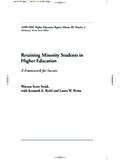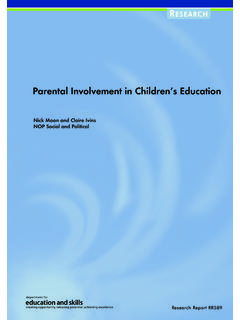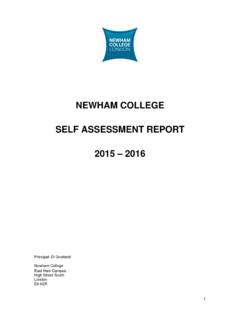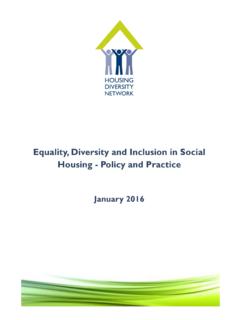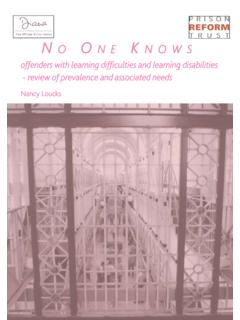Transcription of The experience of black and minority ethnic staff in ...
1 The experience of black and minority ethnic staff in higher education in EnglandAcknowledgmentsAcknowledgmentsAck nowledgmentsEquality Challenge Unit (ECU) would like to thank the higher education Funding Council for England (HEFCE) for funding this research through its leadership, governance and management fund. ECU and the research team would like to thank all those who have contributed to this research. We are particularly grateful to all the participants for their time and willingness to share their would also like to thank the members of the race forum, who supported the research project and provided essential advice and direction: =Professor Mark Cleary, vice-chancellor, University of Bradford (chair) =Professor Harinder Bahra (deputy chair) =Cathy Abu, University of Bedfordshire =Professor Yahya Al-Nakeeb, Newman College Birmingham =Clive Anthony, Middlesex University and UNISON =Denise Bertuchi, UNISON =Professor Gargi Bhattacharyya, Aston University and University and College Union (UCU) =Vikki Burge, higher education Funding Council for Wales =Dr Lai Fong Chiu, University of Leeds =Anjana Choudhuri, Swansea University =Delroy Creary, Manchester Metropolitan University and UNISONThis report was researched and written by Professor Valerie Hey, Dr M ir ad Dunne and Dr Sarah Aynsley, Centre for higher education and Equity Research, University of Sussex.
2 Dr Maki Kimura, Dr Alice Bennion and Professor John Brennan, Centre for higher education Research and Information at the Open University; and Jiten Patel. The report was edited by Gary Loke, =Fariba Dashtgard, HEFCE =Dr Bill Gulam, UCU (from October 2009) =Garry Guye, Unite =Bilal Haveliwala, University of Leicester and Unite =Maureen Henry-Johnson, Sandwell College and UCU (until October 2009) =Helen Howard, higher education Academy subject network for sociology, anthropology and politics =Dr Zainab Hussain, University of Liverpool =Patrick Johnson, University of Manchester and higher education Equal Opportunities Network =Maeve Landman, University of the West of England and UCU =Chris Nicholas, UCU =Dr Bertha Ochieng, University of Bradford =Dr Henry Odeyinka, University of Ulster =Naina Patel, Birkbeck College and Universities Human Resources =Paula Shelley, Universities and Colleges Employers Association =Spurgeon Smith, Birmingham City University and UNISON =Jo Westerman MBE, University of Leeds and Unite =Professor Leroy White.
3 University of BristolForewordThe freedom to study and work in an environment free from racial discrimination and prejudice is surely at the heart of any higher education institution, regardless of location or the staff and student demographic. This report shows that whatever ideals we aspire to within our institutions, the reality is frequently rather things are changing very slowly, many senior managers are, like me, white, and from a particular social background. How many of us have experienced the stifling impact of discrimination at work? This report emphasises how the lived experience of discrimination damages individual lives, suffocates talent and fundamentally undermines the very purpose and efficiency of the institutions in which we was invited to chair the forum, which brought together an immensely experienced group of colleagues from across the sector to work together in a robust, challenging and collegial way to advise on the research questions and input into the methodologies.
4 Discussions at forum meetings brought starkly home just how damaging and deep-seated issues of race inequality are in our institutions. The lived experiences that forum members articulated were powerful and often moving reminders of the problems caused by race forum played a part in forming the nature and direction of the research but this report is the product of an independent research team. Reading through some of the sections I can still hear the strong, often passionate debate from forum members about particular examples, sets of proposals or key issues which were felt to discriminate. Such cultures and practices, whether conscious or unconscious, are especially reprehensible in institutions built on academic freedom and recommendations in this report point the way to areas of best practice.
5 I would urge colleagues to take note of these, to be prepared to accept that our institutions may well fall short in some area and to be open and constructive in dealing with issues that are so central to everyone who works in higher Mark Cleary Vice-Chancellor and Principal University of BradfordIf I were to distil one key message about the report recommendations it is that now, more than ever, higher education institutions cannot continue practices and cultures which damage the career development, aspirations and life chances of some racial groups for the benefit of others. Equality Challenge Unit, October 20111 Introduction Background Policy and practice in higher education 32 Project overview Background Methods Research design Challenges 103 Initial research findings Data and monitoring Management practices Relationships and support frameworks Leadership and development opportunities 314 Implementing change Challenges and HEIs concerns Piloted initiatives Additional initiatives 425 Conclusion and recommendations Recommendations 47 References 49 Annexe 1 Research questions 51 Annexe 2 Phase 2 staff interviewed and in focus groups 54 Annexe 3 Phase 3 staff interviewed and in focus groups 56 Annexe 4 Phase 1 institutional policies and practices survey 57 Annexe 5 Selected results from CHERI s CAP survey 70 The experience of black and
6 minority ethnic staff in higher education in EnglandAcknowledgmentsAcknowledgments1 October 201111 IntroductionThis research report aims to explore the lived experiences of BME staff , and how institutional policy and practice may affect BME staff differently. It is self-evident that there are significant challenges facing the higher education sector. The current financial climate, and uncertainty around the effects of the new fees and funding system, have led to some restructuring, redundancies and reduction in services. These may have a greater negative effect on particular groups, and historically this has included black and minority ethnic (BME) earlier literature review from ECU highlighted some of the continuing issues facing BME (2009) The experience of black and minority ethnic staff working in higher education : literature review introduction of the Equality Act 2010 means that higher education institutions (HEIs) are now working within a new legislative framework.
7 Where this research highlights a disparity between previous legislative ambition and the lived experiences of staff , the new legislation may provide a fresh opportunity for HEIs to drive equality forward for the benefit of those staff and BackgroundThe Race Relations (Amendment) Act 2001, born out of the Stephen Lawrence Inquiry, introduced a statutory general duty upon public authorities, including HEIs, to promote race equality. The general duty had three elements, to: =eliminate unlawful racial discrimination =promote race equality =promote good relations between people of different racial groupsUnderpinning this general duty were several specific duties: statutory requirements designed to help institutions meet the general duty. These specific duties required HEIs to: =produce and publish a race equality policy with a clear, targeted action plan =monitor recruitment/admission and progression of staff and students according to racial group2 The experience of black and minority ethnic staff in HE in England21 IntroductionDebates about multiculturalism and identity, ethnicity and religion, and issues of diversity and differences have been the subject of teaching and research in HEIs over several decades.
8 With an expanding and increasingly diverse student population, there have been numerous studies exploring the participation and experiences of different student groups, including BME students (Pilkington 2002; Housee 2004).There is growing recognition that an ethnically diverse higher education workforce positively affects the ability of institutions to deliver their core functions fully to an increasingly diverse student population. Evidence from the NUS (2011) highlights that BME students want a more representative workforce, diverse teaching practices and more BME role models. Many institutions have therefore demonstrated a strong policy commitment to race , despite this, there is extensive evidence that BME staff are underrepresented at senior levels in HEIs. Compared with studies on BME students, research focused solely on the effects of ethnicity of staff in HEIs is limited.
9 However, it has been illustrated =assess the impact of all the institution s policies and procedures on race equality =publish monitoring data annually, and the results of impact assessments as they are carried outThe intention was to help HEIs provide fair and accessible services and to improve equality of opportunity for people of different racial groups. The Race Relations (Amendment) Act has been repealed and replaced by the Equality Act 2010, which continues the positive duty that HEIs have with regard to race. However, at the time of writing, there are no specific duties for this legislative framework, evidence highlights ongoing discrimination experienced by BME , as with the population of Britain, staff and student populations in HEIs have become increasingly diverse, with consequent challenges for HEIs in delivering their core research in the higher education sector3 October 201131 Introductionthat discrimination against BME staff exists (Smith 2007: 116 7).
10 This is substantiated by previous studies (Carter et al. 1999; Blackaby and Frank 2000; Law et al. 2004; Jones 2006) indicating the existence of institutional racism in higher , a programme of research funded by the higher education funding councils for England, Scotland and Wales reported BME staff members experiences and perceptions of discrimination in promotion opportunities and career progression (Deem et al. 2005). There are well documented accounts from BME staff of isolation and marginalisation; challenges to their status, authority and scholarship; high levels of scrutiny and surveillance of their work; and difficulties in gaining promotion (Heward et al. 1997; Deem et al. 2005; Jones 2006; Mirza 2006, 2009; Wright et al. 2007; ECU 2009). The analysis of a survey conducted by the University and College Union (UCU) also shows that almost half of black members have experienced racism or racial discrimination at the workplace (UCU 2009).

